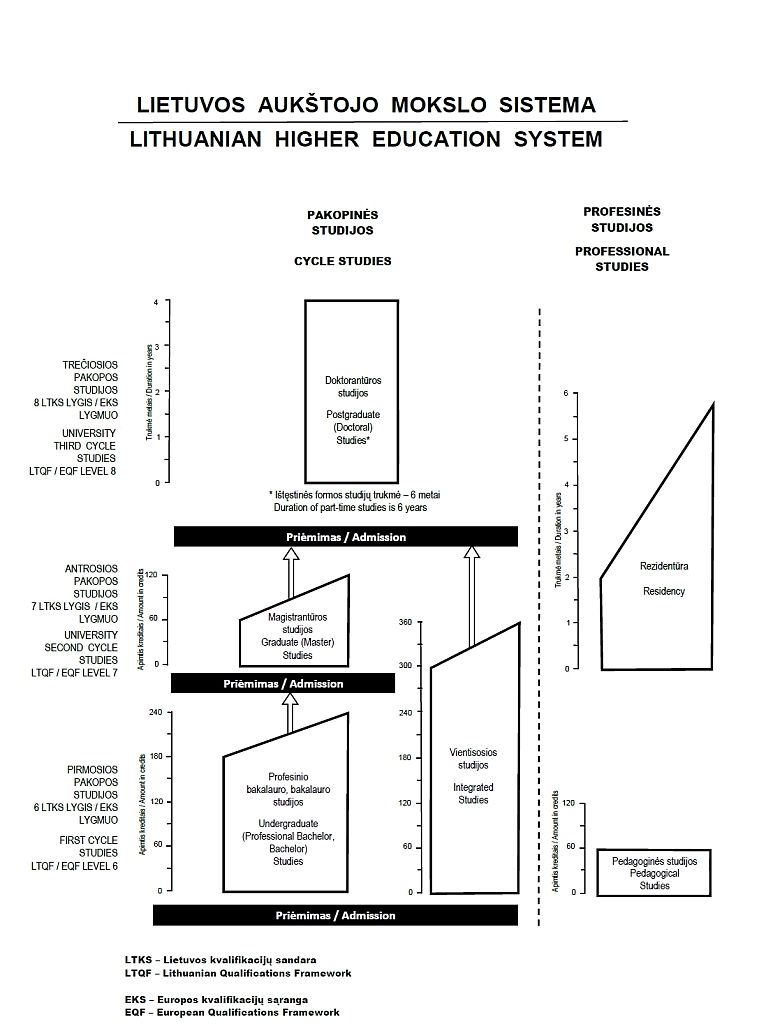|
Name changes (Lithuanian universities and higher education colleges) |
System of Higher Education in Lithuania
Types of institutions
There two types of higher education institutions:
- universities (called universitetas (university), akademija (academy), or seminarija (seminary)) representing university sector of higher edcuation;
- colleges of higher education (called kolegija (higher education college) or aukštoji mokykla (higher education institution)) representing non-university higher education sector.
Universities offer university level degree granting studies and award Bachelor’s, Master’s, Doctoral degrees. Colleges offer college level degree granting studies and award Professional Bachelor’s degrees. Both universities and colleges can also offer non-degree granting studies.
Until 2000, higher education system was unitary. The binary system of higher education consisting of university sector and non-university sector was introduced in 2000.During the institutional reform, which started in 2000 a non-university (college) higher education sector was gradually developed on the basis of aukštesnysis mokslas (advanced vocational education and training), which was vocationally oriented, was offered by aukštesnioji mokykla (advanced vocational education and training school), and did not form a part of the higher education system. The reform aimed to phase out advanced vocational education and to develop a non-university higher education sector. Under the reform the schools that were sufficiently qualified to provide non-university higher education were made into higher education colleges (kolegija) or departments of such colleges.
After the institutional reform (2000), vocational education and training programmes were still provided by colleges for several years. Aukštesniojo mokslo diplomas (advanced vocational education and training diploma), certifying completion of post-secondary, but not higher education, continued to be issued for graduates who have entered the schools prior to the reform,. The last students of the advanced vocational programmes graduated in the academic year 2006-2007.
Degree-granting studies
In Lithuania, the following degrees can be awarded:
- 1st cycle: profesinis bakalauras (Professional Bachelor) or bakalauras (Bachelor);
- 2nd cycle: magistras (Master);
- 3rd cycle: mokslo daktaras (Doctor of Sciences) or meno daktaras (Doctor of Arts).
1st cycle
Applicants to such cycle of studies are required to have brandos atestatas or an equivalent qualification. Profesinis bakalauras (Professional Bachelor) degree is awarded after completion of college level study programmes which are more oriented towards preparation for professional activity and applied research. Professional Bachelor’s degree programmes require completion of 180-210 credits. After completion of the studies Profesinio bakalauro diplomas (Professional Bachelor’s Diploma) is awarded.
Up to 2007 graduates of college programmes were issued an Aukštojo mokslo diplomas (Diploma of Higher Education) indicating the title of the awarded qualification, for example vadybininkas (manager), kineziterapeutas (physiotherapist), auklėtojas (educator), etc. Since 2007, colleges have obtained the right to award profesinis bakalauras (Professional Bachelor) degree. Following national legislation, both qualifications are considered equal.
Bakalauras (Bachelor) degree study programmes are oriented to expand one’s general education and provide knowledge in certain field of science or art and offer the background necessary for further study or professional activity. The programmes require completion of 210-240 credits. Compared to college studies, university curriculum is more academically oriented. After completion of the studies Bakalauro diplomas (Bachelor’s Diploma) is awarded.
Up to 2009, following national legislation, after completion of such type of programmes, only a title of a qualification, for example mokytojas (teacher), etc., but not a Bachelor’s degree could also have been awarded. In such cases, Aukštojo mokslo diplomas (a Diploma of Higher Education) was issued to the graduates.
2nd cycle
Magistras (Master) degree study programmes are designed to prepare for independent research activity or any other activity the performance of which requires scientific knowledge and analytical competence. The programmes require completion of 90-120 credits. After completion of the studies Magistro diplomas (Master’s diploma) is awarded. To be admitted to second cycle studies, a person must have obtained a Bachelor’s or Professional Bachelor’s degree or a comparable qualification, and meet requirements set by the accepting higher education institution.
Up to 2009, specialiosios profesinės studjios (specialised professional studies), another type of 2nd level studies was a part of higher education system. After completion of such studies, a professional qualification could have been obtained without the right to enter university 3rd cycle studies (doctoral studies). Specialised professional studies were intended for better preparation for activities which require special practical ability. In order to complete these studies 40 – 80 credits were required to acquire. Applicants to such studies had to have a Bachelor’s degree or an equivalent qualification. After completion of the studies Aukštojo mokslo diplomas (Diploma of Higher Education) was awarded.
Currently, the specialized professional studies can be transferred as a part of Master’s degree studies. The qualifications obtained after completion of specialised professional studies in the field of pedagogical studies are comparable to non-degree granting studies.
The Master’s degree may also be awarded after completion of integrated long-cycle (vientisosios) university studies, which combine the 1st and 2nd cycle of university studies. Traditionally, these studies are offered in several fields of medicine, pharmacy, veterinary medicine, law, and religious studies. Applicants to the integrated long-cycle studies are required to have a brandos atestatas or equivalent qualification. Workload of the programmes is 300-360 credits. After completion of the studies Magistro diplomas (Master’s diploma) is awarded.
In previous years, following national legislation, after completion of integrated long-cycle studies only a title of qualification, for example teisininkas (lawyer), gydytojas (physician), veterinarijos gydytojas (veterinary surgeon), vaistininkas (pharmacist), but not a Master’s degree could also have been awarded. In such cases, Aukštojo mokslo diplomas (Diploma of Higher Education) was issued to the graduates.
3rd cycle
Applicants to mokslo daktaras (Doctor of Science) degree or meno daktaras (Doctor of Arts) degree studies are required to have a Master’s degree or a comparable qualification. The purpose of doctoral studies of science is to prepare scientists who would be able to independently conduct research and experimental (social, cultural) development work, and to solve scientific problems. The purpose of doctoral studies of art is to prepare artists researchers who would be able to create, interpret and develop research based on art practice. Duration of doctoral studies is usually of 4-6 years. After completion of the studies Daktaro diplomas (Doctoral Diploma) is awarded.
In 2000-2009, following national legislation three types of the 3rd cycle studies were as follows:
- doktorantūra (doctoral studies), studies leading to a research degree, lasting a maximum of 4 years;
- rezidentūra (residency) studies of Medicine, Odontology, and Veterinary Medicine to prepare specialists for practical activities and leading to a professional qualification (3-6 years nominal duration). Residency studies are committed for the practical training of medical doctors, veterinary surgeons and dentists. Since 2009 residency belongs to a non-degree granting studies (please, see the paragraph on non-degree granting studies below);
- meno aspirantūra (art studies) designed for the preparation of teachers in higher education institutions in the field of arts and for specialization of artists. Such studies led to a meno licenciatas degree (80 credits required, please see the paragraph on credits below). Following national legislation, last students of such programmes graduated in 2012.
Non-degree granting study programmes
Holders of higher education qualifications are eligible to such programmes. The programmes can be provided by colleges and universities and do not lead to a degree. The aim of programmes is to prepare students for independent professional practice or to upgrade professional qualification. To this type of programmes belongs:
- residency (rezidentūra) programmes in medicine, odontology, veterinary medicine;
- programmes in pedagogical studies (pedagoginės studijos).
Duration of residency studies is from 2 to 6 years. Rezidentūros pažymėjimas (Certificate of Residency) is awarded after completion of residency studies.
The workload of non-degree pedagogical studies is from 30 to 120 credits. Studijų pažymėjimas (Certificate of studies) is issued after completion of other non-degree granting studies.
Quality Assurance
The quality of higher education institutions and programmes is assessed externally by the Centre for Quality Assessment in Higher Education. There are three types of accreditation in Lithuania: institutional, ex-ante (new) programme accreditation, and study field accreditation. More information on the accreditation is available at: http://www.skvc.lt/en/content.asp?id=1 .
Recognized higher education institutions
The list of recognized higher education institutions and accredited study programmes is available at here.
Fields of study (unofficial translation)
Credit system
After introduction of the new credit system on September 1st, 2011, one credit corresponds to one ECTS credit. The average workload of full-time studies is 60 credits per study year.
Until the year 2000 the system of study credits was not fully developed and legally embedded therefore the workload was mostly determined by higher education institutions. The system of national credits was legally embedded in 2000. One credit corresponded to 40 relative hours (or to one week) of student’s work (in classes, laboratories, independent work etc.) or to approximately 1.5 ECTS (European Credit Transfer and Accumulation System) credits. The average workload of full-time studies was 40 credits per study year.
Diploma supplement
Since 2006, Diploma supplement (diplomo priedėlis) is issued for all graduates after completion of first and second cycle studies. Up to 2006, Diplomo priedas providing information about the completed study programme used to be issued together with a diploma.
Grading System
Since 1993 a ten-point grading scale with 5 as the minimum pass grade and with 10 as the maximum pass grade is in use.
|
Result |
Grade |
Short description in Lithuanian
|
Performance description |
|
PASS |
10 |
puikiai |
Excellent performance, outstanding knowledge and skills (excellent) |
|
9 |
labai gerai |
Strong performance, good knowledge and skills (very good) |
|
|
8 |
gerai |
Above the average performance, knowledge and skills (good) |
|
|
7 |
vidutiniškai |
Average performance knowledge and skills with unessential shortcomings (highly satisfactory) |
|
|
6 |
patenkinamai |
Below average performance, knowledge and skills with substantial shortcomings (satisfactory) |
|
|
5 |
silpnai |
Knowledge and skills meet minimum criteria (sufficient) |
|
|
FAIL |
4 |
nepatenkinamai |
Knowledge and skills do not meet minimum criteria/below minimum criteria (insufficient) |
|
3 |
|||
|
2 |
|||
|
1 |
Alongside the ten-point grading the institution can use the pass/fail system of evaluation. Examinations and work defence evaluations, as a rule, are graded. For the courses that do not end with examinations the pass/fail system is used to test if a student has earned the credits allocated to it. A student passes when he/she proves that he/she assimilated not less than 50 %of the required knowledge scope.
|
Until 1993 a 5-point grading scale with 3 as the minimum pass grade and five as the maximum pass grade was used.
For some courses the pass/fail system for evaluation was also used. |
Outline of the Lithuanian System of Higher Education

Soviet System of Higher Education in Lithuania
Since mid-1940s until 1991, higher education in Lithuania followed the Soviet system of higher education.
Types of institutions
There were two types of higher education institutions: universities (universitetas) and higher education institutions, specialising in a certain field of study, such as engineering, medicine, agriculture, veterinary, education, arts, etc. Specialised higher education institutions were called institutas (institute), akademija (academy), or konservatorija (conservatory). Both types of higher education institutions had the same status in terms of academic standards, admission requirements, awarded qualifications, etc.
Qualifications
In most fields of study the nominal duration of the programmes was 5 years, in several fields, such as education, the duration of some of the programmes was 4 or 4.5 years, in the field of medicine the duration of study was 6 years.
Graduates were issued a diploma (diplomas), indicating the title of the awarded qualification, for example, matematikas (mathematician), gydytojas (medicine doctor), mokytojas (teacher). Holders of the qualifications had access to postgraduate studies for Kandidat nauk and Doktor nauk.
According to Ministerial order No. 754, adopted on the 26th of April 2002, by the Minister of Education and Science of the Republic of Lithuania, such qualifications are currently equated to the level of a Master’s degree. Holders of these have the right to enter the 3rd cycle studies (doctoral studies).
Name changes (Lithuanian universities and higher education colleges)
The attached lists provide information on the dates establishment and closing (if applicable) as well as name changes of higher education institutions. The lists is not indicative of the previous status of institutions. For information on the previous status of the listed institutions, please contact the Centre at enicnaric@skvc.lt .



